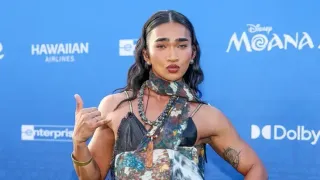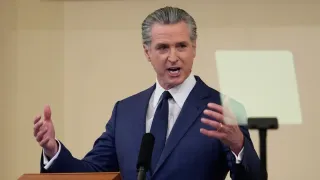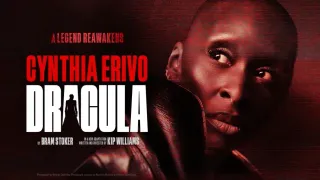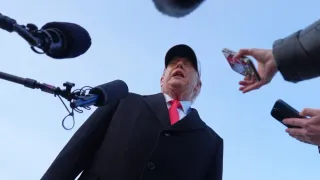May 24, 2022
SF DocFest 21's Queer Winners You Won't Want to Miss
Brian Bromberger READ TIME: 7 MIN.
The 21st San Francisco Documentary Film Festival (SF DocFest) is returning from June 1-12 and will involve a hybrid presentation of virtual screenings and live presentations, shown at the Roxie Theater. Most of the latter will also include in-person Q&A sessions.
DocFest has always screened a number of queer films. This year there is one feature and seven shorts. The feature is the documentary "Keep the Cameras Rolling: The Pedro Zamora Way." It is a terrific film to be treasured. Even if you never watched MTV's "The Real World" (one of the first examples of reality TV) set in San Francisco in 1994, the program that made Pedro a household name, this documentary will help you understand why he deserves to be remembered and cherished.
Diagnosed as HIV-positive at the age of 17, the charismatic and articulate Zamora, with movie star looks, became an expert AIDS educator who had a gift for reaching out to queer youth and POCs in Miami, where he lived after his family escaped Cuba in the 1980 Mariel Boatlift.
"Keep the Cameras Rolling" uses archival footage of Pedro and his "Real World" days as well as contemporary interviews with his family, friends, and castmates. Former President Clinton and Dr. Anthony Fauci extrapolate on Pedro's continued importance.
Pedro became the first PWA many viewers knew, teaching the world about living with HIV. Sufferers were still often regarded with fear and suspicion, but Pedro's message was that they were just as normal as anybody else. Pedro was one of the few openly gay people on TV at that time.
It's astounding as "Real World" roommate Judd Winick recalls that just a few months prior to the start of that series, there had been a huge controversy when on Fox TV it was announced its "Melrose Place" show would feature a kiss shown between two men. Melrose producers caved in and turned the camera away when the guys actually smooched.
"Real World" not only casually filmed Pedro kissing his boyfriend Sean Sasser, but in a first ever, televised their marriage on the show in a commitment ceremony, a gay wedding decades before it was even legal. Pedro also testified about HIV in front of Congress, which Clinton praises.
The reflections by Winick and housemate Pam Ling are particularly moving, as they not only married years after the show ended, but have dedicated their lives to HIV activism and pre-serving Pedro's legacy. The film asserts Pedro was the right guy at the right time. Likeable, vulnerable, full of heart, and brave, he lived out his own mission of accepting people for who they are, changing the conversation in America around HIV, but also about being gay.
As if on cue, Pedro died at age 22, a few hours after the final episode of "Real World" aired. This documentary was created with a team of 20 students at the University of Missouri's Murray Center for Documentary Journalism.
Close to three decades after Pedro's death, this documentary brings him back to life and in another era of pandemic and bitter divisiveness he seems as relevant as ever. "Keep the Cameras Rolling" is a fitting keepsake tribute for a unique enduring role model, dwelling less on loss and more on celebration. This documentary will also play at Frameline.
Also Screening
"Act of Coming Out" (11 minutes) is powerful and stirring. A group of queer and trans actors in Los Angeles audition for the role of coming out to someone. Reenacting these scenes, they draw from their own experience, but the audience isn't sure whether what they're seeing is reality or performance.
One actor gave a tearful convincing coming out to his mother, but afterwards revealed to the camera, he had not done so in real life. What was particularly poignant was each actor then had to play the person with whom they had just come out, expressing what they hope that person would have said to them if this were happening in real time.
Despite all the progress made in LGBTQ equality and assurances how matter-of-fact and easy it is today, this short argues that coming out can still be a stressful, anxious, emotionally draining experience for many queer people. The film was made as part of Stanford University's Documentary MFA Program.
"Black Veil" (27 minutes) explores again the courage it takes to declare oneself nonbinary, neither male or female, an identity not fully recognized by our larger society. Bradley has struggled with their own gender identity for years. Bradley is facing two significant events in their life. Bradley has recently joined the Sisters of Perpetual Indulgence and has completed the requisite charitable work before officially being ordained as a nun and receiving the Black Veil.
The second turning point is Bradley's wedding to long-term partner Emma. Will these two milestones give Bradley the confidence to declare confidently an authentic version of themselves? The film adroitly addresses the challenge of being nonbinary which is so much more than just adopting new pronouns, but living out and embodying a message of inclusivity.
"The Last Call for Alcohol" (27 minutes), covers the history of a San Francisco bar at Church and Market called Lucky 13, which lasted for 27 years until it was sold in 2018 for seven million dollars, presumably to build condos. Built right after the 1906 earthquake, the bar had many incarnations, including western-themed gay bars like The Mind Shaft, Alfie's, and the High Chapparal.
As Lucky 13 it encompassed a tight-knit community of working-class straight and LGBTQ patrons, in what used to be called a dive bar. The film interviews several long-term customers and bartenders, devastated by its loss.
However, this short is also an effective indictment of a city bent on making money at the cost of providing sustainable housing, thus pricing business and residents out of the city. The film contends convincingly that in abandoning community spaces like Lucky 13, San Francisco is also losing its unique soul. This short will leave you both sad and angry about how the city is allowing these cultural casualties to occur repeatedly to its detriment.
Other promising shorts not available to the Press include "Distance Between," a conversation between a cisgender person and a trans person, each trying to learn what it means to be queer and trans.
"It's Just Me," concerns black transgender woman Allie Cole in Austin, Texas negotiating the demands of sex work, activism, a complex relationship with her parents while overcoming a childhood trauma and finding love.
"(Trans)Femininity" centers on Giovanna, Maeva, and Alyx, three transgender women, teaching us the necessity of deconstructing the binary gender concept, which has been cultivating feminine/masculine stereotypes for centuries.
"Queering Yoga" tells the story of six Queer/Trans/QTPOC yoga teachers and their personal stories of healing/transformation as they have journeyed in their yoga practice helping them explore identity and community.
SF DocFest runs June 1-12 at the Roxie Theater, 3117 16th St., and streaming online. sfdocfest2022.eventive.org www.roxie.com
Help keep the Bay Area Reporter going in these tough times. To support local, independent, LGBTQ journalism, consider becoming a BAR member.






